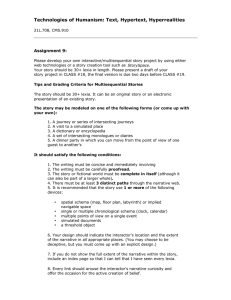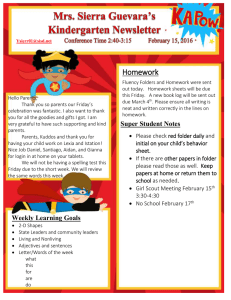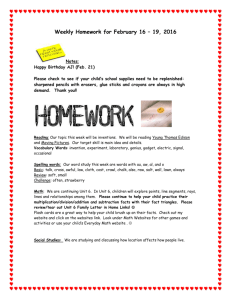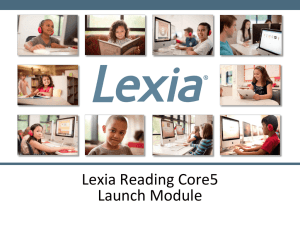TEAC HER TRA IN IN GGU ID E
advertisement
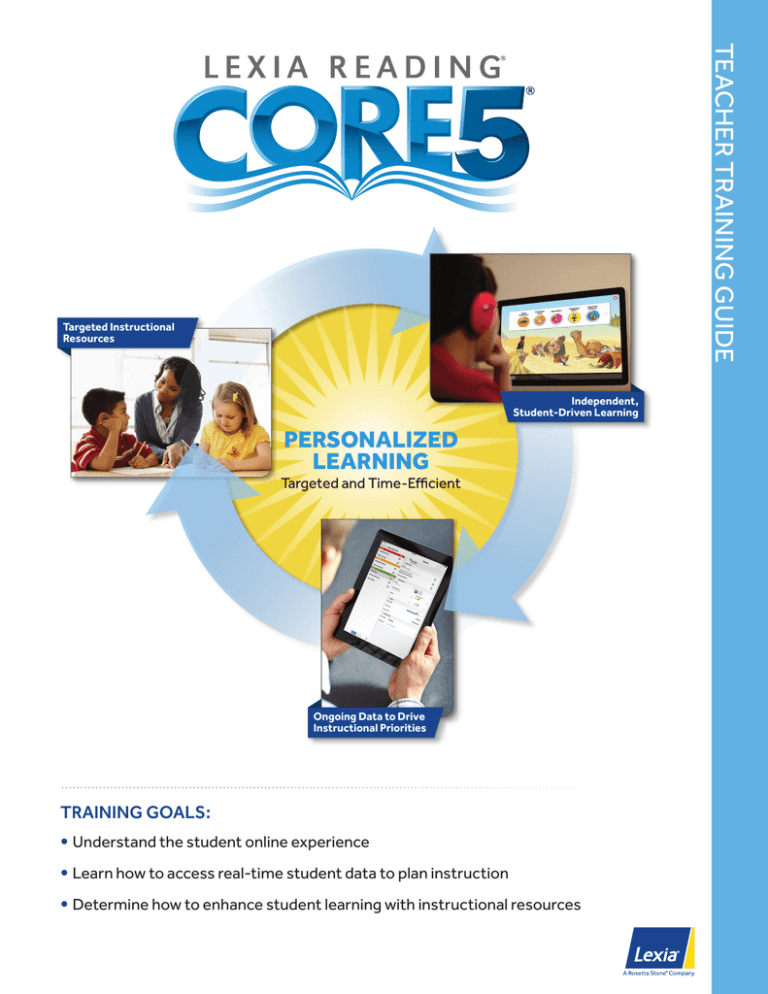
TEACHER TRAINING GUIDE Targeted Instructional Resources Independent, Student-Driven Learning PERSONALIZED LEARNING Ongoing Data to Drive Instructional Priorities TRAINING GOALS: • Understand the student online experience • Learn how to access real-time student data to plan instruction • Determine how to enhance student learning with instructional resources What Is Lexia Reading Core5? Lexia Reading Core5® is a personalized reading curriculum for Pre-K through Grade 5 students of all abilities. • S tudents learn, practice, and consolidate fundamental literacy skills by interacting with the online, adaptive program, by receiving teacher-led Lexia Lessons® and Lexia® Connections, and by completing independent, paper-based activities using Lexia Skill Builders.® • Real-time student data are captured and made available in actionable reports in www.myLexia.com to help educators make informed instructional decisions to help students achieve grade-level benchmarks. • Lexia Reading Core5 is designed to meet and exceed rigorous state standards including the Common Core State Standards. The program includes activities that work on six components of reading (Phonological Awareness, Phonics, Structural Analysis, Fluency, Vocabulary, and Comprehension). GRADE 1 GRADE 2 GRADE 3 GRADE 4 GRADE 5 1 LEVEL 1 A PICNIC IN THE WOODS LEVEL 2 A DAY AT THE BEACH LEVEL 3 A SNOW DAY IN THE CITY LEVEL 4 THE AMAZON RAINFOREST LEVEL 5 THE SCOTTISH CLIFFS LEVEL 6 A DAY IN PARIS LEVEL 7 THE AFRICAN SERENGETI LEVEL 8 THE SOUTH POLE LEVEL 9 THE EGYPTIAN DESERT LEVEL 10 AN ENGLISH GARDEN LEVEL 11 THE SWISS ALPS LEVEL 12 A RUSSIAN CIRCUS LEVEL 13 THE INDIAN RAINFOREST LEVEL 14 A JAPANESE GARDEN LEVEL 15 THE GREAT BARRIER REEF LEVEL 16 A HAWAIIAN PARADISE LEVEL 17 A SOUTHWEST FIESTA LEVEL 18 THE ANCIENT GREEK COUNTRYSIDE • • • • • • • • • • • • • • • • • • • • • • • • • • • • • • • • • • • • • • • • • • • • • COMPREHENSION / STRUCTURAL ANALYSIS PHONICS • • • • • • • • • • • • VOCABULARY GRADE LEVEL OF MATERIAL K The six components of reading are represented by these color-coded icons used throughout the program. AUTOMATICITY FLUENCY PRE-K SKILL PHONOLOGICAL AWARENESS SCOPE AND SEQUENCE • • • • • • • • • • • • • • • • • • Lexia Reading Core5: Getting Started GETTING READY TO USE CORE5 • Identify how students will access the program. a. If using a browser, consider bookmarking your site’s unique url, which can be found in www.myLexia.com. b. If using a desktop-installed version or a tablet, find the Core5 icon. • P rint login cards for students from the Manage tab in myLexia. • Ensure that students have working headphones that fit properly and have adequate volume. AUTO PLACEMENT • W hen logging in for the first time, students will complete a set of placement activities. Students will be automatically placed at their appropriate starting level in the program according to their performance. • Students begin the Auto Placement with their grade-level skills and branch up or down to a level that is not too easy or too hard. • Students are assessed on both word identification and comprehension skills at each level. • Most students finish the Auto Placement within 20 minutes. If the session is interrupted, data will be saved, and students will start where they left off next time. www.lexialearning.com You can use your myLexia username and password to log in to Core5® Educator Mode, where you can explore all levels and activities. Always encourage your students to do their best on the placement test as this will determine where they will start in the program. 2 Lexia Reading Core5: The Student Experience STUDENT DASHBOARD A Students can monitor their usage and unit progress at login and logout. C B On the Student Dashboard, students can see A Total weekly time online compared to their usage target B Total units completed for the week D C Logout D Current Level AUTOMATICITY WARM-UPS Students begin each session with a warm-up. The goal is to promote speed of processing and automaticity for previously acquired skills. The student will choose one of two warm-ups and try to beat his or her highest score. ACTIVITY SELECTION SCREEN The warm-up will take roughly one minute to complete. A A ctivity—Students choose a picture to enter an activity focused on a specific skill. B U nit Meter—Unit boxes fill in as students complete units in the activity. C P hase Indicator—To pace students through a level, the first half of all activities must be completed before the second half is unlocked. F A B C D D S kill Badge—When an activity is finished, a skill badge appears in place of the completed activity. E F un Facts—Clickable images appear on the Activity Selection Screen to enhance contextual knowledge and increase engagement. F Logout—Returns students to home screen. 3 E Level 1 has four activities and Levels 2–18 have five. G ACTIVITY SCREEN The following buttons and tools are available in every activity: A Information Apple—This indicates program status with three colors: blue, white, or red. It will be blue when completing Auto Placement, white when working through the program, and red when the student needs support. Click the apple for more details. D B Volume D Current Unit Bar—This indicates progress through current unit. A B C E R epeat Prompt F R ehear Directions G L eave Activity foot E F Data are captured when the Current Unit Bar is filled (unit complete) or when the student moves within the unit from one step of Instructional Branching to another (see below). foot foots feet feetses feets Standard Step feet feets feetses Guided Practice Step Hop on one foot. www.lexialearning.com C Unit Meter—This indicates completion of units in the current activity and matches the unit meter on the Activity Selection Screen. Instruction Step 3-STEP INSTRUCTIONAL BRANCHING Units adapt based on each student’s individual performance. • S tandard—This step is indicated by a green bar and is the first and most complex step in a unit. Students must complete it successfully to progress. • Guided Practice—This step is indicated by a blue bar and is the first reached if errors are made at Standard. It contains tailored, scaffolded practice based on those errors. If successful, the student returns to Standard. • Instruction—This step is indicated by a yellow bar and is the first reached if errors are made in Guided Practice. It explicitly teaches the specific skill and provides scaffolded practice. Upon completion of this step, the student returns to Standard. 4 Data to Inform Instruction www.myLexia.com allows you to plan your week, check student usage, monitor progress, and celebrate success. A P lan Instruction lists the students who need immediate teacher support on the skill in the assigned Lexia Lesson. B The pie chart summarizes students’ Performance Predictor scores. It indicates the percentage of students who are On Target to reach end-ofyear, grade-level benchmarks and the percentage who are at Some Risk or High Risk for not reaching benchmarks. Class Combined Report Plan Instruction HOW IS MY CLASS PROGRESSING? A Performance Predictors 7 students need instruction in 6 skills. updated monthly Core5 Level 2 (Beg K) F Each student’s actual minutes (time spent online) are updated upon logout. G The “+/Add” column tells you how many more minutes each student needs this week (Monday–Sunday). 33% 39% Maryellen Gough (+6) Core5 Level 2 (Beg K) Lesson Sight Words 3 28% Lexie Keeler 18 students Leamon Merchant On Target (80-100%) Core5 Level 2 (Beg K) Some Risk (31-79%) High Risk (1-30%) Lesson View Progress Report Long Vowel Teams Attie Winfield Two Syllable Words Meeting Lexia Usage Eleanor Southern C 100% Lesson Sight Words 5 Aron Sorrell Core5 Level 2 (Beg K) Lesson Passage Comprehension 5 Georgiana Dunning 80% 60% 40% 20% 0% Dec 31 (5) View Skills Report Jan 7 (16) Jan 14 (16) Jan 21 (18) Usage is shown for Full Weeks Only, Beginning Mondays (Number of students who logged in that week) View Auto Placement Report 56% of students consistently met their recommended usage since December 31 Scroll to the bottom of the page to view your Class Table. Priority: High D Medium View Usage Report Low Prescription of Intensity Name Grade Predictor Last Week This Week 111 |n/a Altman, Rosevelt 3rd 100% Atherton, Earlene 3rd 33% Blank, Mortimer 3rd 100% Burrows, Viviana 3rd 100% 111 |n/a Crawley, Elizabeth 3rd 68% 13 | 30 Dunning, Georgiana 3rd 100% 46 | n/a Flemming, Portia 3rd 85% 82 | 20 Gough, Maryellen 3rd 1% 17 | 60 Hutto, Ruben 3rd 81% 51 | 20 Jacks, Gussie 3rd 83% 53 | 20 3rd 1% 15 | 60 45 3rd 3% 30 | 60 30 3rd 31% 57 | 50 E 6 | 50 F91 | n/a Merchant, Leamon 3rd 1% 30 | 60 Osburn, Marie 3rd 42% 73 | 50 Sorrell, Aron 3rd 36% 26 | 50 Skills (Completed) + - Lesson Met Actual|Target Add 18 Students Priority Icons indicate students are on the Plan Instruction Keeler, Lexie list with an assigned Lexia Lesson. The color of the Latimer, priority Callie icon matches their Performance Predictor. Legg, Lora 5 B Lesson Picturing Stories 1 D C olumn headers can be used to sort the Class Table when planning instruction. E A green check shows that a student met his or her usage target last week. Print February 1, 2013 Core5 Level 2 (Beg K) C The Meeting Lexia Usage graph shows the percentage of the class meeting usage targets each week. 2nd Grade % of Students Meeting Usage WHO IS STRUGGLING? Archer 2nd P K 1 2 3 4 Certificates 5 3 Weeks Ago 44 G This Week 17 3 Weeks Ago 43 Today Last Week 30 Last Week 24 Student-Targeted Action Items A Click a student’s name to open the Student Combined Report. < A District Overview Traci Ruby Student Combined Report Print Skills Current: Core5 Level 11 P K 1 2 3 4 Performance Current: 80% D The View Skills Report link provides historical performance data and parent report versions in English and Spanish. Aug Progress Action Plan 1243 5th Achievement Available 7 min/wk Increase Usage Actual 13, Target 20 min/week Lesson Spelling Rules 1 1091 4th Grade Level of Material Level 10 completed on Jan 02 946 3rd 795 2nd 569 1st 286 K 42 PreK Unit 13: Spelling Dictated Words (ck, tch, dge) Sep Struggling on: dge Independent Practice Nov Jan Mar May Jul Units Gained Last Week: 10 Units Simple Suffixes Units Gained This Month: 25 Units Advanced Word Chains Units to Target: 114 Units More Practice C Working On Core5 Level 11 View Progress Report Started on January 2, 2014 53% Hard and Soft C & G Unit 10: Auditory Discrimination (initial position hard/soft g in one syllable words) 50% Syllable Division Unit 11: Vowel Identification (flex rule - v/cv) 50% Synonyms & Antonyms Unit 5: Identifying Antonyms for Common Objects 80 60 40 20 0 50% Sentence Structure Meeting Usage 100+ Student Usage (m/wk) C Click View Progress Report for parent-friendly visual representations of student progress. Sep Aug www.lexialearning.com • D etermine if the student is getting enough time on Core5. • View specific skills that the student is struggling on, and access Lexia Lessons to support the student. • Print Lexia Skill Builders (independent practice worksheets) for application and generalization of skills that have been completed online. B Weekly Usage Current: 13 min 5 Sep B The Action Plan provides you with a “to-do” list to support the student. 2nd Grade Units HOW DO I SUPPORT AN INDIVIDUAL STUDENT? Dec 31 Jan 7 Jan 14 Jan 21 Unit 6: Identifying Subject, Predicate, and Interrogative Pronouns (where, how, when) D Met Target Last Week: Yes Time This Week: 13 Minutes View Skills Report Usage Target: 20 Minutes Total Time This Year: 25 Hours 17 Minutes Last Used: Thu January 31, 2013 Common Core Standards 2ND GRADE STANDARDS ACCURACY PROGRESS Overall Medium Foundational Skills Medium Phonics and Word Recognition Fluency Informational Text View Usage Report 85% Medium Low Anne Johnson Medium Literature Low Language Medium I Completed Level 15 I’m a Lexia Superstar Root Meanings I can…read and understand words with Latin-based roots, like export, predict and construct. Sight Words 7 I can…read and spell common sight words, like caught, certain and usually. Passage Fluency 4 I can…readPlease passages accurately and fluently. of securely. This document may contain sensitive information about students. dispose Multiple Meaning Words 2 I can…understand words with multiple meanings, like shed, spring and draft. Passage Comprehension 4 I can…read passages and answer questions that focus on summarizing and paraphrasing. At Home Ask me about…the new words I have learned and help me look and listen for these words in the world around me. Help me build my skills by reading aloud with me. Go to Achievement Available on the Action Plan to print certificates for students who complete a level. Additional certificate options are available on the Resource Materials tab of myLexia. Then, I can tell you about what we have read in my own words. 6 Targeted Instructional Materials The Lexia Reading Core5® program provides Instructional Materials to ensure that students receive personalized and comprehensive instruction and practice in all skill areas. These materials can be incorporated into classroom routines in a variety of ways, including whole class instruction, small group activities, and independent work. Recommended in myLexia based on performance Supplemental Comprehension Lessons Lexia Lessons Lexia Skill Builders® Lexia® Connections Description Scripted, explicit instruction for targeted intervention Practice worksheets for application and generalization of skills Activity suggestions to introduce, reinforce, or extend a skill Scripted instruction to enhance reading comprehension Focus Students who are struggling with a skill in an online activity Students who have completed an online activity All students to supplement instruction All students to supplement instruction Grouping Individual Small group Whole class Individual Peer or adult partner Individual Small group Whole class Individual Small group Whole class Delivery Teacher-led Primarily independent with opportunities for peer collaboration Teacher-mediated with opportunities for peer collaboration Teacher-led Scope 161 lessons 431 pages 144 pages 35 lessons ® Student Experience 7 Available as additional resources in myLexia All Instructional Materials offer multi-sensory activities that reinforce and extend online learning and provide opportunities for oral expression, writing, and collaboration. Additional Instructional Resources ACCESSING INSTRUCTIONAL RESOURCES • Log in to www.myLexia.com. • To access specific Lexia Lessons for your class or particular student, view the Plan Instruction list or student Action Plan (see pages 6–7). • To access specific Lexia Skill Builders by student, view the student Action Plan (see page 7). TIPS: ORGANIZATION AND DISTRIBUTION OF MATERIALS Lexia Lessons • Have a full, printed set available by the copier. • Save paper: • Print only reproducibles and view Lesson scripts online. • Laminate and reuse reproducible pages. • Project reproducible graphic organizers. Lexia Reading Core5 LEXIA LESSONS Lexia Reading Core5 LEVEL 12 | Comprehension Using Context, Lesson 1 Description This lesson is designed to help students understand new vocabulary by looking for meaning in the words and sentences that surround the unfamiliar word. Strategic readers think about words in context, evaluating their own understanding as they read. Teacher Tips The following steps show a general strategy lesson for using context to figure out meanings of unfamiliar and multiple-meaning words. The lesson may be expanded to include particular context clues often found in informational and academic texts. During discussions, remind students to listen to others, take turns and speak in complete sentences. Preparation/Materials LEXIA LESSONS •The ___ was on a busy street. (house) Today, we are going to learn how to figure out the meaning of an unfamiliar word using the context of what we are reading. The context includes the words and sentences around the word we don’t know. There are steps we can take to use the context. When we come across a word we don’t know, we can do these four things. Display the following four steps shown below in bold. Read and explain each step. Step One: Reread and read ahead. When you find a word you don’t know, stop and reread the other words that come before it and after it. Step Two: Identify context clues. Think about the meaning of the other words in the text. Step Three: Decide on a meaning. Use what you know from the context to decide what the unfamiliar word means. Step Four: Check that meaning in the context. The meaning you decided on should make sense in the sentence. Display Sample Text 1 and have students follow along as you read: The lion grabbed the mouse in its huge paw. The little mouse’s body shook with terror. “Oh, please, Mr. Lion, don’t hurt me,” the mouse cried in fear. Option 2: When reading aloud to students, pause to check comprehension of unfamiliar vocabulary. Use the term context when discussing how to figure out likely meanings and model how to use the four steps. SKILL BUILDERS Name: LEVEL 2 | Phonological Awareness Blending & Segmenting syllables the study of the mind three syllables 3 4 Discuss how they knew the meaning and what kind of clue they found in the context. Expand the lesson by using this chart during students’ own readings to identify context clues. Encourage students to look for other examples. Option 2: Expand the lesson to present other strategic behaviors that proficient readers use when meeting a new word. Use examples from students’ own reading to ask and answer these questions together: 6 •Do I need to understand the meaning of this word to understand the text? (If the answer is no, keep reading. If the answer is yes, try using the context to get a likely meaning.) 7 •Does the context help me understand the word meaning? (If the answer is yes, keep reading. If the answer is no, use a dictionary or other source to get meaning.) path auto ology an instrument to see things that are far away naut scope tele a person who navigates through the stars anti naut astro the study of time chron phobia ology a person’s own written signature graph auto derma a written message sent from far away path gram tele a fear of books phobia meter biblio an instrument for measuring a person’s hearing audio meter geo the study of sound theo phon ology 8 9 umbrella, hamburger, apple, gumball, banana, candle In Sample Text 1, point to the underlined word terror. 10 Re-read Sample Text 1. Students who complete this lesson should return to the online activities in Lexia Reading Core5. For further development of automaticity with these skills, provide students with Lexia Skill Builders. Script page 4 1 psych ology sphere the study of disease 5 I’m not sure what terror means. So I am going to use these four steps to use the context of the story to help me figure it out. First, I’ll reread and read ahead. Script page 1 psych ology psychology 2 Display the Context Chart shown on the last page of this lesson. Review the chart with students and have them give meanings for the underlined words in the examples. Point to each step as you model the following. Level 17 | Structural Analysis Greek Combining Forms 1 Read the definition. Choose the Greek combining forms to make the word that matches the definition. Write the combining forms in the correct order on the lines. Then write the whole word on the line below. 1 Option 1: As students read textbooks and informational books and articles, they encounter new terms. Often, academic texts provide particular kinds of context clues that students can learn to look for. •The family ___ in a little house. (lived) SKILL BUILDERS two For Students Ready to Move On •He had two sisters and one ___. (brother) Direct Instruction Lexia Reading Core5 Lexia Reading Core5 Cut out the pictures. Count the syllables in each word. Glue the pictures onto the correct number. Option 1: Provide practice with the concept of context by displaying sentences with blanks for missing words. Encourage students to suggest words that fit in the blank. Talk about the other words in the sentence that helped them make their suggestions. •Raymond was the youngest ___ in his family. (son, boy, child) • Copies of the sample texts at the end of this lesson. • Create individual student binders or folders. • Organize by classroom set. • Save paper: • Use page protectors or laminate to make reusable with dry erase markers. • Consider annotation apps that allow students to work electronically. Name: For Students Who Need More Support Examples of sentences: • A copy of the four “Using Context” steps used in Direct Instruction. Lexia Skill Builders LEVEL 12 | Comprehension Using Context, Lesson 1 Adaptations www.lexialearning.com • T o access a complete listing of Lexia Lessons, Lexia Skill Builders, and Lexia Connections, view the Resources tab at www.myLexia.com. raining on Demand videos provide useful T information about Core5 from getting started to utilizing reports. Simply click on the Training on Demand link in the Resources tab. • Click the Resource Materials link to find additional resources, including • Supplemental Comprehension Lessons • Teacher’s Manual • Training Guides • Achievement Certificates • School-to-Home Materials • Instructional Resources such as flashcards and vocabulary support materials Choose two words and write sentences for each word on the back. 4 8 Implementation Models WHERE AND WHEN CAN I USE LEXIA WITH MY STUDENTS? Think about your school, class, and student needs and resources to determine which implementation model will work best in your school. Keep in mind that a combination of models may maximize student gains. CLASSROOM (CENTER ROTATIONS) In a typical reading block, there is usually a significant amount of time for center rotations. Here is one way Core5 can be used in a rotational model: •U se a student’s Prescription of Intensity to prioritize which students should spend time on the computer. • Use small group time to teach Lexia Lessons to struggling students. •A llow independent practice and peer work using Lexia Skill Builders to further develop automaticity and expand expressive skills. • Set up collaborative group activities to reinforce skills using Lexia Connections. COMPUTER LAB In a computer lab, a whole class can use Core5, allowing each student to work on skills appropriate to his or her needs. Struggling students can also be pulled for a Lexia Lesson, either right in the lab or back in the classroom with a teacher or support personnel. INTERVENTION BLOCK/SPECIAL EDUCATION For Tier II or Tier III students using Core5, the intervention block can be used to deliver the Lexia Lesson(s) specific to each student’s needs. In myLexia.com, the student can be assigned to multiple classes so that all teachers working with a student can view data and identify appropriate Lexia Lessons. BEFORE/AFTER SCHOOL For students who need additional time based on their Prescription of Intensity, before- and after-school programs provide another opportunity to spend time on the computer. This additional time can also be used for targeted instruction using Lexia Lessons or for practice with Lexia Skill Builders. Remember, student data are always tracked in myLexia.com regardless of when or where the work is completed. HOME USE To solidify skills already completed online, Lexia Skill Builders can be used as homework for all students. Use the Homev Use letter in myLexia.com to communicate with parents about using Core5 at home. This is an important way for students to gain additional time to meet their Prescription of Intensity. 9 Implementation BEST PRACTICES AND TIPS FOR SUCCESSFUL IMPLEMENTATION ➀ Students consistently meet weekly recommended usage. • D evelop a schedule using all available technology resources in your school (classroom computers, computer lab, laptop carts). • T each students how to monitor their own usage using Student Dashboard. 1 3 • C onsider alternate times for students who need additional minutes (before/ after school programs, home use, intervention block). eachers monitor student progress at T www.myLexia.com and plan instruction based on students’ needs. • Set a regular time to check reports at least once a week. • S chedule data conversations with other teachers, parents, and students. 2 www.lexialearning.com ➁ • Consider printing some reports for data conversations. ➂ tudents receive targeted instruction with Lexia Lessons S and practice opportunities with Lexia Skill Builders. • V isit www.myLexia.com to view Plan Instruction lists and students’ Action Plans to identify students who need a Lexia Lesson or Skill Builder (independent practice). • D esignate specific times during the day for instruction and practice (center rotations, intervention block, homework). • S et aside time to explore, prepare, and organize materials. View Lexia Lessons online, and only print necessary reproducible pages. Use binders, folders, or systems for storing printed materials, including Skill Builders. Check out Lexia’s Training on Demand videos under Resources at www.myLexia.com. 10 # Your www.myLexia.com username is your school email address. username | password | Lexia Customer Support 1 800 • 507 • 2772 • support@lexialearning.com Additional Support THE 5-MINUTE CHECK-IN! www.myLexia.com has the data that can help you. In just five minutes, find out the answers to the following questions: ■ WHO NEEDS HELP? Check the Plan Instruction to see which students are struggling right now and require a teacher-led lesson. ■ WHO NEEDS MORE TIME ONLINE? ■ WHO IS READY TO CELEBRATE? Check the Class Table for usage information. Print out certificates to help celebrate student success. ■ WHAT ARE MY NEXT STEPS? Access Lexia Lessons, Lexia Skill Builders, and Lexia Connections under the Resources tab. SCHOOL-TO-HOME TIPS •E ncourage Lexia Reading Core5 for home use. This is a great way for students who are behind in skills to catch up to their grade level. •U se the parent letters (available under the Resources tab) to communicate with parents. Parent letters are available in 7 languages. •E mphasize that home use of Lexia Reading Core5 is for the enrolled student only—not siblings or parents. •U se the Parent Report link in the Student Skills Report to share results in English and Spanish with parents during conferences. For a visual report, use the Student Progress Report to show a student’s performance. TRC5TTG-0816 300 Baker Avenue Suite 320 • Concord, MA 01742 www.lexialearning.com tel: 800-435-3942 / 978-405-6200 fax: 978-287-0062
